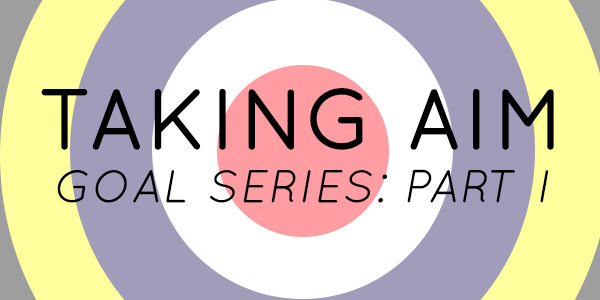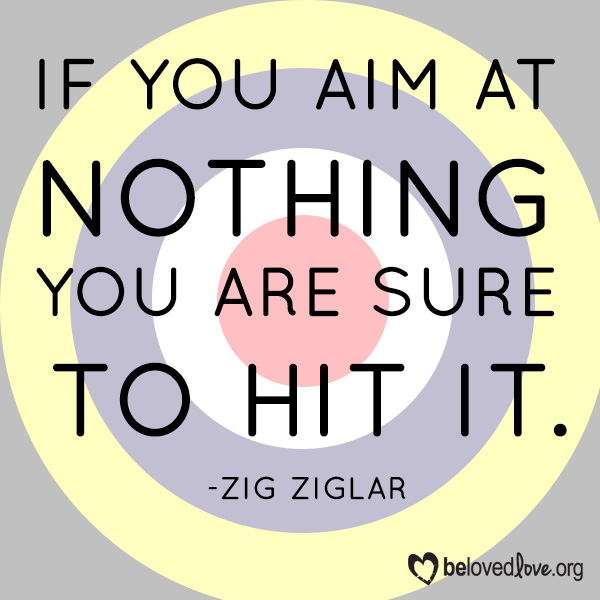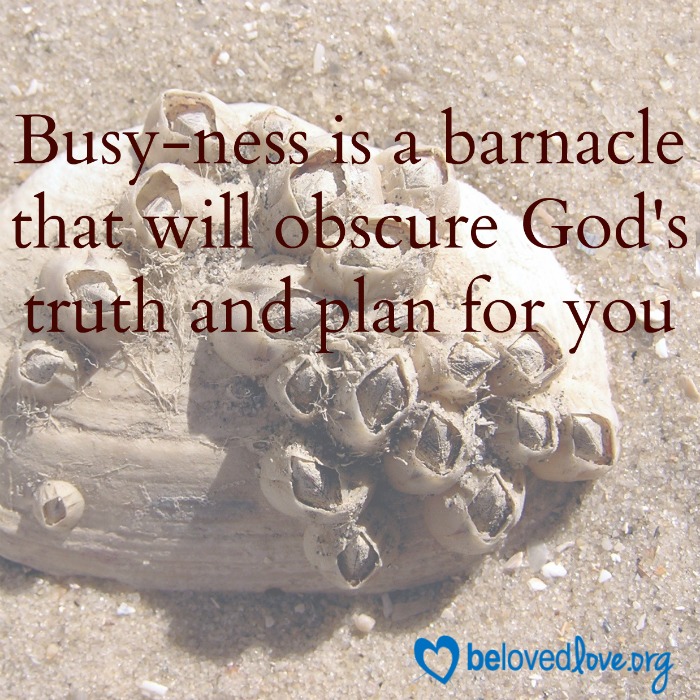Even though our beloved Packers missed the Super Bowl by a hair’s breath, we will be part of the football faithful watching the big game this year. We watch a lot of football at our house. So the Super Bowl is an event rivaling the importance of Thanksgiving or Christmas, no matter who is playing.
In fact, you could consider us a football family. Football lore and stats are often bantered about our house. My husband Andrew is fond of mentioning that Drew Brees, the quarterback for the New Orleans Saints, is more accurate than a world class archer. Brees once took a challenge to see how many times he could hit an Olympic archery target at 20 yards throwing a football–he hit the bull’s-eye ten out of ten times. Check out the video.
That is crazy. How does he do that? Practice, certainly. But the first step in any skill is deciding where you want to go—identifying your target, and taking aim. Drew decided years ago he wanted to be a great quarterback, and he has been practicing his throws ever since.
Taking aim
There is a saying by Zig Ziglar that says, “If you aim at nothing, you are sure to hit it.” Another great saying is “A long journey begins with the first step.” if that is true, it makes sense that your first step of the rest of your life should be to figure out what you are aiming at in your life.
What are you aiming for in life?
What are you aiming for in life? What a great question to ask yourself as the New Year begins. Putting it another way: What drives your decisions? What are you focused on in life?
Are you even aiming at anything?
I think most of us are aiming at things, and usually these goals are based in core beliefs that we hold, and/or driven by needs we feel compelled to meet. But our beliefs and motives may not be obvious to us. In fact, we can be immobile, and still be aiming at something. Perfectionists have this down to an artform: we stop before we start, because we don’t BELIEVE there is any possibility of success. Here are a couple of examples:
- You might believe that you are worthless, and have nothing to contribute. So you choose to not try.
- Or you might believe that whatever you might attempt, it must be done “perfectly.” You might tell yourself: I can’t do anything right so I might as well not start.
Floating
Is it possible to live life without focus or aim? Maybe, but I doubt it. Some people truly seem to float through life. We all know people like this. Floaters are professional victims. Life “happens” to them. It is as if they have given up on themselves. They can be in a perpetual pity party, or just aimlessly floating along from one thing to another. Even though is seems like they don’t have any goals or focus, I believe they do, but it is rooted in a fixed false belief: they don’t have any power over themselves or their circumstances, or they care more about doing nothing than making a difference. Their goal is to do the least amount possible. They think doing nothing (except maybe complaining) is the path of least resistance, but it truly is not. Passivity carries much more problems and headaches than purposeful action, and leads to much greater misery. Floaters eventually float right over a waterfall, pitching them—and anyone with them– right out of the boat and into a torrent of churning water.
How to figure out what you are aiming at: Take a look at the past.
We are all aiming at something, whether we realize it or not. The best predictor of future behavior is past behavior, so if you want to know what is important to you–what you are currently aiming at in life–take a look at the past. How you spent your most important assets–time and money—is a great indicator of what has been important to you, and what will likely guide future decisions. This is relatively easy to do.
How to find out your main goal (s) for the past year:
1. Just pull out your checkbook and your calendar for the past week/month/year, and ask yourself: How did I spend my time? How did I spend my money?
- Start with broad categories, and then estimate what percentage of your time and money was spent on each, or how many hours you spent on each. (Don’t get all OC about it. We are just getting ballpark figures here.) Here is an example and some possible categories (Make these as broad or narrow as you like.):
- Time:
- Sleep (8 hours/day, 56 hours/week, 240 hours per month) 30% of the time
- Eating (2 hours/day) 6% of the time
- Internet/TV/video games
- Exercise
- Time with people (face to face or phone, not texting or internet)
- Work
- Chores
- Travel
- Prayer/worship/meditation
- Reading the Bible
- Reading
- Hobbies/Interests
- Childcare
- Volunteering
- Money:
- Bills
- Housing
- Groceries
- Starbucks
- Out to eat
- Savings
- Presents (friends and family)
- Charity or similar giving
- Schooling
- Entertainment
2. Why? A very powerful question If you want to take this one step further, go to each of the categories (at least the most important ones) and ask yourself “Why?” three times:
For example: 30% of your time was spent sleeping.
- Why? Because my body needs sleep to function properly.
- Why? Because that is how my body is built.
- Why? I want to be healthy and for my body to function optimally.
Asking why repeatedly helps you to drill down to your more basic motivations, which can uncover true or false assumptions, or assumptions that need to be challenged.
- Do I need to sleep?
- What amount of sleep is optimal for me?
(Of course most of us would agree that 8 hours of sleep in our day is a pretty good use of our time. But some areas might not be so clear.)
3. What has been your main goal?
Now look through your lists and your whys. What common themes are there? If you could summarize your life, what would you say your main focus or goal has been? Come up with 1-3 things. Now you have a much better idea of what you have been aiming at (if anything) in the past year, and, therefore, where you are likely to be focused in the coming year.
Is this really where you want to go?
So now comes the kicker question: Is this where you want to go? Why or why not?
For example: If you can see that your primary focus has been to get an education, ask yourself: Why are you doing this? And why are you studying this? Is this your ultimate aim in life? If not, what is? What led you to this decision? Is it a direction you still feel you need to go? Why? It may lead you to other questions: How much money DO you need to make? What kind of career ARE you supposed to have? Does it fit the set of gifts/talents God has given you, or is it just a means to a financial end? What beliefs or thought processes are guiding these choices?
When you start asking these type of questions, you are well on the road to figuring out not only what has guided your past choices, but consciously [as opposed to passively] choosing if this is the right way for you to continue in your future.
Share with us: What have you discovered as you examine your goals this year?
Recent posts: A Note In Your Lunchbox, To Be, To-Do To Be




 Busy-ness is a persistent parasite, like barnacles on a sea shell. Busy-ness attaches itself to my life through “extra” expectations and goals and plans. If I allow these barnacles to grow and multiply, my priorities and my calling become almost unrecognizable. I come to believe that these embellished plans are God’s will for me, and I convince myself that no one but I can accomplish these plans–not even God. My time is consumed by either working on these altered plans, or worrying about them. Gone is my willingness to begin each day in God’s presence, and to seek His guidance throughout my day. There is no time. I must hurry. There is much to do.
Busy-ness is a persistent parasite, like barnacles on a sea shell. Busy-ness attaches itself to my life through “extra” expectations and goals and plans. If I allow these barnacles to grow and multiply, my priorities and my calling become almost unrecognizable. I come to believe that these embellished plans are God’s will for me, and I convince myself that no one but I can accomplish these plans–not even God. My time is consumed by either working on these altered plans, or worrying about them. Gone is my willingness to begin each day in God’s presence, and to seek His guidance throughout my day. There is no time. I must hurry. There is much to do. By Lydia Floren
By Lydia Floren